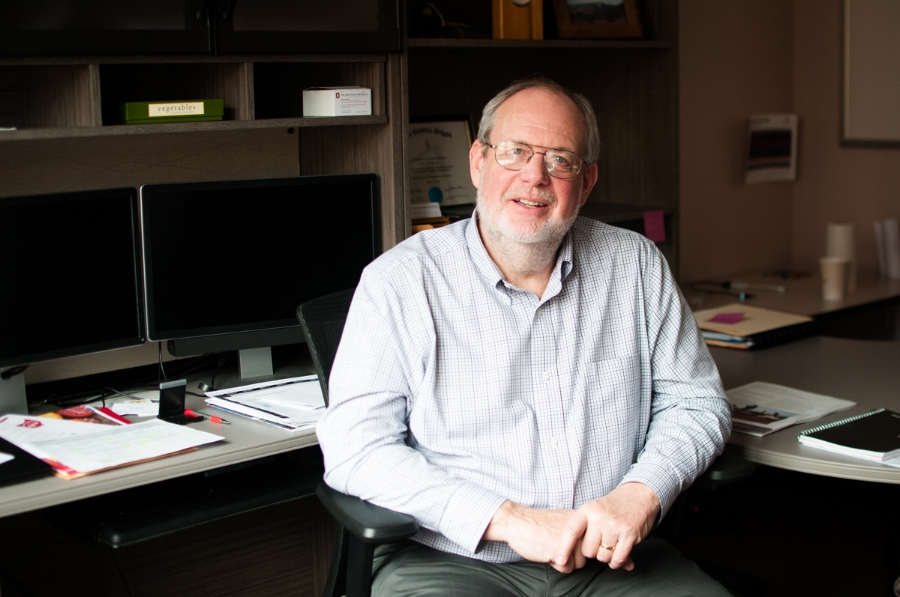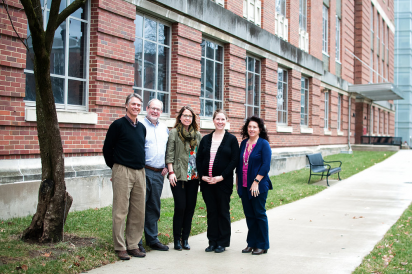The Facts on InFACT
Executive Director Brian Snyder is heading up The Ohio State University's Initiative for Food and AgriCultural Transformation (InFACT) where leaders from the sciences, engineering and the humanities are joining forces to combat food insecurity in Ohio. Here at Edible Columbus we’re excited to see what innovations, conversations and collaborations InFACT brings to the tables of our local food communities throughout the state. Read more to learn what’s to come from Brian and his dynamic team.
What are your top five goals for InFACT at OSU in the coming years?
The goals I personally have for InFACT are not all that relevant, though I am very excited to identify collective goals with the dozens of faculty members who will be working with us, along with students, administrators and other Ohio State stakeholders.
It’s also important that we understand what our top goal will be—the idea that will drive success in all areas we choose to address. We are right in the middle of a strategic planning process, but it looks like our driving goal will be to address food security concerns in Ohio such that we are no longer below both the national and regional averages in that category. A university with the resources we have available, situated within a major agricultural state, should be able to move the needle in this fundamental way.
We also want to change the way we, as a society, look at food security in general, so that it is not just a matter of providing more food to those who need it, but also an understanding of the nutritional needs of all citizens, regardless of their socioeconomic status. Everyone should have a right to an adequate food supply that is nutritious and produced in a way that assures the long-term resilience of the food system itself.
So a food system that achieves our principal goal would have to be focused on good nutrition, fairness to all participants (including farmers and farm workers), economic viability, environmental soundness and the strength of communities throughout Ohio. There’s a good five-point plan for us to pursue.
Who are some of the leaders you’re bringing to OSU to add to your team at InFACT and why?
We are hiring 31 new faculty members across the university, in many different colleges and departments, to address food security from a variety of perspectives. As I have already said, the issue of food security is not merely, or even primarily, one of producing more food for those who need it. It’s also about producing the right food and assuring its availability to all citizens, without diminishing the resources we will need in the future.
We have hired a nutritionist in the College of Medicine, a landscape architect, a sociologist, an anthropologist, scientists in various other areas, and we currently have a number of searches underway. We are committed to bringing the best people we can find, many of them at the beginning of their careers, so that we can take both a broad-based and long-term approach to solving a very perplexing problem. We truly want to succeed, and for Ohio State to become a source of expertise and inspiration for food system work at other universities as well.
How will you and your team partner with local farmers and farms in the region to meet some of these goals?
I grew up in rural Indiana, was active in both 4-H and FFA as a young man, and have been involved with farming in one way or another all of my life. I see and can understand that farmers in this country are at a major crossroads in terms of keeping their farms viable and addressing increasing demands from consumers who want to understand how and where their food is produced. Farmers routinely take huge risks in order to stay in business, and uncertainties with weather, the marketplace and public policy are their biggest obstacles.
Our job at InFACT will be to work with existing farmers to diversify their farms and, whenever possible, to move toward production of crops and livestock that can be utilized (and appreciated) as close to home as possible. The emphasis needs to be more on quality than quantity, which will increase margins for farmers and improve the nutritional security of the customers and communities they serve. These changes will represent an evolution, not revolution, of the way existing farms operate, one step at a time.
In contrast to that, we also need to support new farmers starting up with the intent to grow food for their own families and communities as a priority. This is where the real transformation of the food system will continue to take root, as it has in the past couple of decades, though we now have a much better understanding of how existing and new farmers must work together to make the whole system work better for everyone.
How has the landscape of the sustainable food and farming movement changed in the past few years, and what do you see as new developments on the horizon?
As the movement has become more mainstream, it has encountered more mainstream types of conundrums. There is now more internal competition for public attention and program funding, and various for-profit ventures can threaten to blur the focus we prefer to have on achieving the common good. Such occurrences are a sure sign of success, but also present problems that must be addressed in moving ahead. The biggest challenges we are now facing involve finding new ways of getting food from local and regional farms to people who want it, and to “scale up” the sustainable food supply in general. The reality is that sustainable food systems are moving from being less a philanthropic interest to more of a commercial activity, and individual enterprises will need to struggle not only to succeed financially, but to maintain the values that created and supported this phenomenon in the first place.
With climate change and global food issues influencing so many aspects of the food movement, how can Ohioans effect change on a global scale by acting locally?
Building successful local food systems is, in fact, a strategy for achieving global change. The further apart consumers and farmers have drifted through history, the less either party has understood or cared about the challenges faced by the other.
To heal the rift is to heal our society, and to make possible the ability of society as a whole to work on mitigating, and even reversing, climate change. We have the know-how needed to fix the environment while also eating better, but we lack a unified vision and the political will to do so. Local food systems can get us where we need to be as a global community as fast, or even faster, than any other strategy.
Why is the sustainable food and farming movement so important to our future?
This question contains its own answer. Without food and farming systems that are truly sustainable, there is no future worth pursuing, at least here on Earth. Various writers and scientists have imagined that someday we will need to leave this planet as the ultimate solution to the intractable environmental problems we have unleashed. That is classic avoidance at its worst. We know how to do things differently, and we must.





